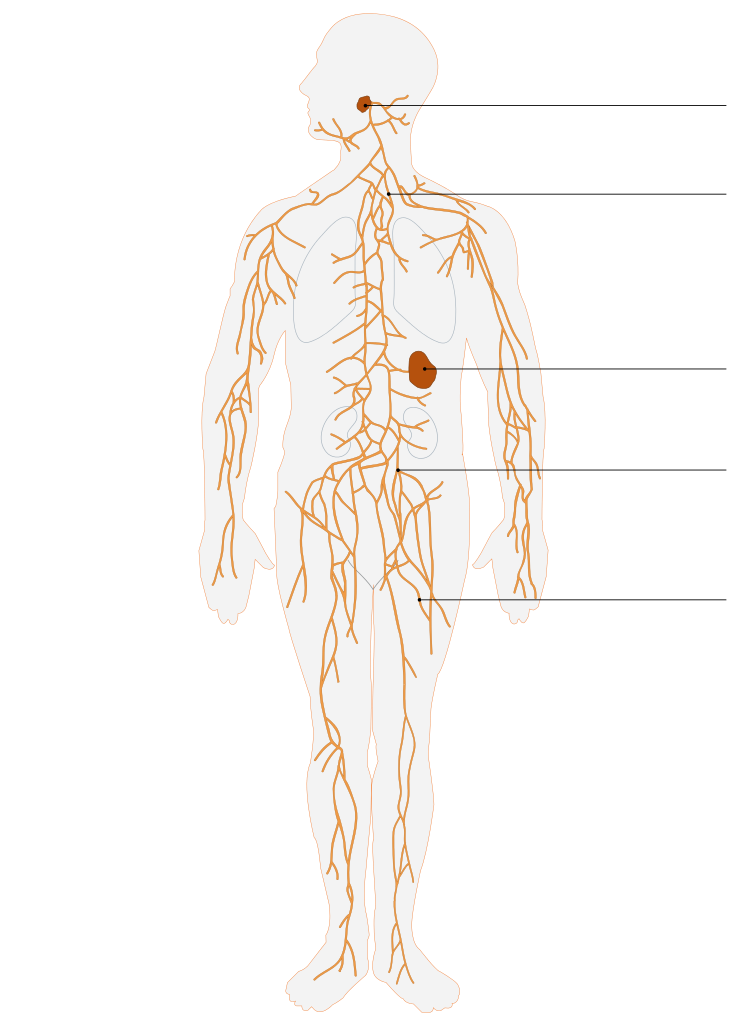The role of lymphatic system in our body
Lymphatic system is part of closed circulatory system and immune system in vertebrates. It is an organ system which is made up of large network of lymphatic vessels and tissues. source. The fluid which is flowing inside lymphatic vessels is called lymph. The lymph is squeezed through lymphatic vessels due to pressure which is exerted due to movement of skeletal muscles and breathing. Two important organs of lymphatic system are spleen and thymus. The study of lymphatic system is called lymphatology.

The different components of lymphatic system are described below:
Lymph:
It is also known as lymphatic fluid. It contains extra fluid which drains substances from different tissues and cells. These substances include proteins, minerals, damaged cancer cells and other foreign invaders like bacteria and viruses. It also transports white blood cells (lymphocytes) which were died during fighting with infections inside our body. source. The lymph is normally transparent and clear fluid. It is important to note that it is different from the blood because it lacks red corpuscles, platelets and other plasma proteins. It has also less quantity of phosphorus and calcium as compared to blood. However, like blood, the lymph has also ability to clot the blood.
Lymphatic Capillaries:
There are millions of blood capillaries in our body. There is another network of thin vessels which are mixed with blood capillaries but are not connected to them. These are known as lymphatic capillaries. These look similar to blood capillaries but their function is different. These capillaries pick the fluid which leaks into our tissues and pump to our circulatory system. source. These capillaries are blind at one end. Their diameter is not uniform, however, they are wider than blood capillaries.
Lymphatic Vessels:
The lymphatic vessels are located throughout the body and are larger than capillaries. Most of them have valves to keep the lymph flowing in one direction. These drain lymph from tissues to throughout the body. These resemble veins in structure but their walls are thinner. If lymphatic vessels are blocked, it may lead to oedema. source.
Lymphatic Nodes:
The lymph nodes are kidney shaped organs and are wrapped in fibrous tissue. They contain lymphocytes, microphages and plasma cells. Many lymph nodes are linked together by lymphatic vessels. The lymph nodes are very important for proper functioning of our immune system. These filter the foreign particles including the cancer cells and they can destroy them. The microphages remove the microorganisms, foreign particles and cellular debris from the lymph. In various diseases, lymph nodes become enlarged or inflamed. The lymphatic nodes are normally found in groins, armpits and neck. source
FUNCTIONS OF LYMPHATIC SYSTEM:
In one minute, lymphatic system returns less than 28 grams of fluid to the veins. It performs many important functions in our body:
- It destroys the attacking microorganisms and foreign particles in the lymphatic nodes by releasing lymphocytes.
- It removes extra tissue fluid from the extracellular spaces and put it back into the blood.
- Some of the fluid from the digestive tract is absorbed into the lymph. The lymphatic vessels store the fluid from digestive tract temporarily, and release it gradually to the kidneys for urine excretion.
- It carries nitrogenous waste materials and carbon dioxide that diffuse in the tissue fluid.
- It carries lymphocytes and antibodies from the lymphatic nodes and releases it to the blood.
- It maintains the quality and quantity of the blood by restoring the fluid balance.
- It removes and transports waste products and abnormal cells from the lymph.
SPLEEN:
The spleen is largest component of our lymphatic system. It is dark red organ located in abdomen just below the diaphragm. It varies in size and shape from person to person but normally it is about 4 inches long. It pays very supportive role in our body. It acts as a filter for blood. It recycles the old red blood cells and stores white blood cells and platelets. It also fight certain kinds of bacteria. In severe infections, spleen is enlarged. source
THYMUS:
It is part of our lymphatic system and also part of endocrine system. It is found near the neck in the upper chest. It is normally prominent in children and then starts to degenerate in childhood. It helps the lymphocytes to differentiate between foreign cells and body local cells. It produces Thymosin hormone, which stimulates the development of T-cells which fight diseases.
TONSILS:
Thank you for reading! Stay Safe!👋😌
Resources:
!discovery 25
This post was shared and voted inside the discord by the curators team of discovery-it
Join our community! hive-193212
Discovery-it is also a Witness, vote for us here
Delegate to us for passive income. Check our 80% fee-back Program